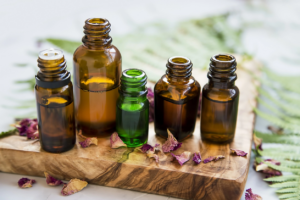Are Synthetic Fragrances Harmful?

Falling in love with a product’s smell is an experience that most people can relate to. However, in recent years the conversation has risen around the potential negative side effects of using fragrances – particularly synthetic fragrances – in our beauty routines.
Are synthetic fragrances really that bad, and should we be taking their potential risks seriously? In this blog post, we’ll dive into synthetic fragrances and cover everything from how they’re made, to their potential pitfalls as well as explore possibly healthier alternatives.
What Are Synthetic Fragrances?

Synthetic fragrances are used across the board
Many of the fragrances we use or experience every day are created from synthetic compounds. When it comes to beauty products, synthetic fragrances are usually chemicals that are added to products, and which enhance the scent of their formulas. These fragrances are used across the board: household products, cleaning products, soaps, hair care products and skincare products. They’re typically manufactured in a laboratory by combining several compounds, and they can replicate the natural scents of fruits, flowers, or other substances found in nature.
Among the most popular synthetic fragrance ingredients are phthalates, which are used to help scents remain longer on the skin, and synthetic musks, which are used to give fragrances a (you guessed it!) musky scent. Benzyl alcohol, benzene derivatives and formaldehyde are also frequently used in synthetic fragrances.
How Are Synthetic Fragrances Made?

The science behind synthetic fragrances.
As mentioned before, these fragrances are usually manufactured in a laboratory environment under strict protocols. The methods used to generate these fragrances have been in a constant state of development over the last century, and some recipes go as far back as the 1880s!
Synthetic fragrances are made using chemical reactions. The separate fragrance ingredients are combined to generate the final fragrance formula. The scent can be added directly to beauty products, or alternatively mixed with a carrier oil or solvent before being applied to the product.
The Downsides of Synthetic Fragrances

Allergies
Transparency has become increasingly important in the beauty industry in recent years, and many consumers are now searching for brands that are upfront and honest about the substances they use in their products, including fragrances. As a result, some companies are making a concerted effort to reveal information about their scents, such as the precise compounds utilized and any potential health hazards related to those ingredients. Let’s explore some of the potential downsides of using products with synthetic fragrances.
Respiratory Issues
There are many studies that have explored the potential link between respiratory issues such as asthma attacks and the use of synthetic fragrances in beauty products. According to one study published in Air Quality, Atmosphere & Health, fragranced items were linked to an increased prevalence of asthma, wheezing, and respiratory symptoms such as troubled breathing and chest tightness. The study also discovered that fragranced products were more likely to provoke asthma attacks in people who already had asthma.
Allergic Reactions
This side effect is unfortunately quite common. Allergic reactions triggered by synthetic fragrances may lead to skin irritation, redness and inflammation of the affected areas. Other potential side effects of these allergic reactions can cause health concerns such as headaches, nausea and dizziness. It’s very important to be aware of any potential allergies that you might have, and to consider avoiding products that may cause these issues.
Risk of Developing Cancers
The link between synthetic scents and cancer is still being researched, and there is no conclusive proof that they cause cancer in humans. However, some studies suggest that certain compounds in synthetic scents may increase the risk of cancer. Likewise, some synthetic musks and phthalates have estrogenic properties which may contribute to breast cancer development. Additionally, many synthetic scents contain carcinogenic compounds such as benzene, formaldehyde and acetaldehyde.
The Environmental Impact of Synthetic Fragrances

Water pollution is a potential downside
The manufacturing processes that produce synthetic fragrances often have harmful impacts on the environment. There are numerous negative environmental effects, such as the emission of hazardous chemicals and greenhouse gasses, water pollution, and the destabilizing of sensitive ecosystems.
Potentially-Hazardous Manufacturing Processes
It’s important to note that the production of synthetic fragrances can result in a variety of waste products and pollutants, including dangerous chemicals and greenhouse gasses. As a result, some fragrance makers are now looking into more environmentally-friendly and sustainable manufacturing methods.
Water Pollution
Synthetic scents can be washed off the skin and hair and end up in streams, where they may harm aquatic life and destabilize fragile ecosystems. Additionally, phosphates found in the chemical composition of synthetic fragrances may leech into waterways, causing algae to thrive uncontrollably which causes oxygen levels in the water to deplete. This also blocks the sunlight from shining on aquatic plants and creatures, which has a devastating effect on their ability to reproduce and flourish. Overall, this can have a wholly negative effect on marine ecosystems.
Soil Pollution
Chemicals in synthetic scents can leak into the soil, harming plant development and health. Furthermore, dumping synthetic fragrance materials in landfills can add to soil pollution and degrade soil quality. This affects the micro-organisms in the soil which in turn can affect insects, animals and plants. In severe cases, this leads to arable land being destroyed and becoming unsuitable for growing crops.
Alternatives To Synthetic Fragrances

Essential oils offer additional benefits
Not all of the fragrances used in beauty products are synthetic. Fragrances can also be added to products via more organic and natural ways. These alternatives are generally considered safer to use than many of the synthetic fragrances found in beauty products. Let’s take a look at some of the options currently available!
Citrus Fruits
Citrus fruits such as oranges, lemons and grapefruits can be utilized in beauty products to provide an appealing and zesty aroma. These fruits’ peels and oils contain natural aromatic components that can be isolated and utilized instead of synthetic fragrances.
Essential Oils
Essential oils are highly concentrated plant extracts, often used in aromatherapy and beauty products. They are extracted from numerous plants and flowers and give beauty products a more natural aroma. Lavender, tea tree, peppermint, and rose are just a few essential oils commonly utilized in beauty products. Many essential oils have also been shown to offer additional benefits in beauty products, such as increased relaxation, powerful hydration, and extra nourishment.
Beeswax
Honeybees create beeswax, which is a natural wax that can be used in beauty products. It has a gentle honey-like scent and is frequently used to offer a light fragrance in lip balms, creams, and lotions. Beeswax is renowned for its aroma as well as its benefits for skin. It has natural emollient and humectant characteristics, meaning it may help soften and moisturize the skin by allowing it to retain more moisture.
Hydrosols or Flower Waters
The byproduct of the steam-distillation technique (often used to extract essential oils from plants) is hydrosols or flower waters. They have a delicate smell and are frequently used in toners, mists, and other skincare products as a natural alternative.
Vanilla Extract
Vanilla extract is a scent made from vanilla beans. It has a pleasant, warm aroma and is widely found in body washes, lotions, and other cosmetics. Additionally, vanilla extract has a relaxing impact on both the mind and the body. Its sweet, comforting scent can aid in achieving calmness and in the reduction of stress and anxiety.
Conclusion
Although synthetic fragrances are used commonly in beauty products, this doesn’t mean that they are 100% safe. Studies suggest there may be various health risks associated with using them. It’s advisable to search for products that use natural alternatives, such as essential oils, fruits and other plant-based extracts. It’s always good to perform a patch test when using a new product, and monitor your body’s reaction. Remember that just because a beauty product smells amazing, this doesn’t necessarily mean it’s good for your body.

